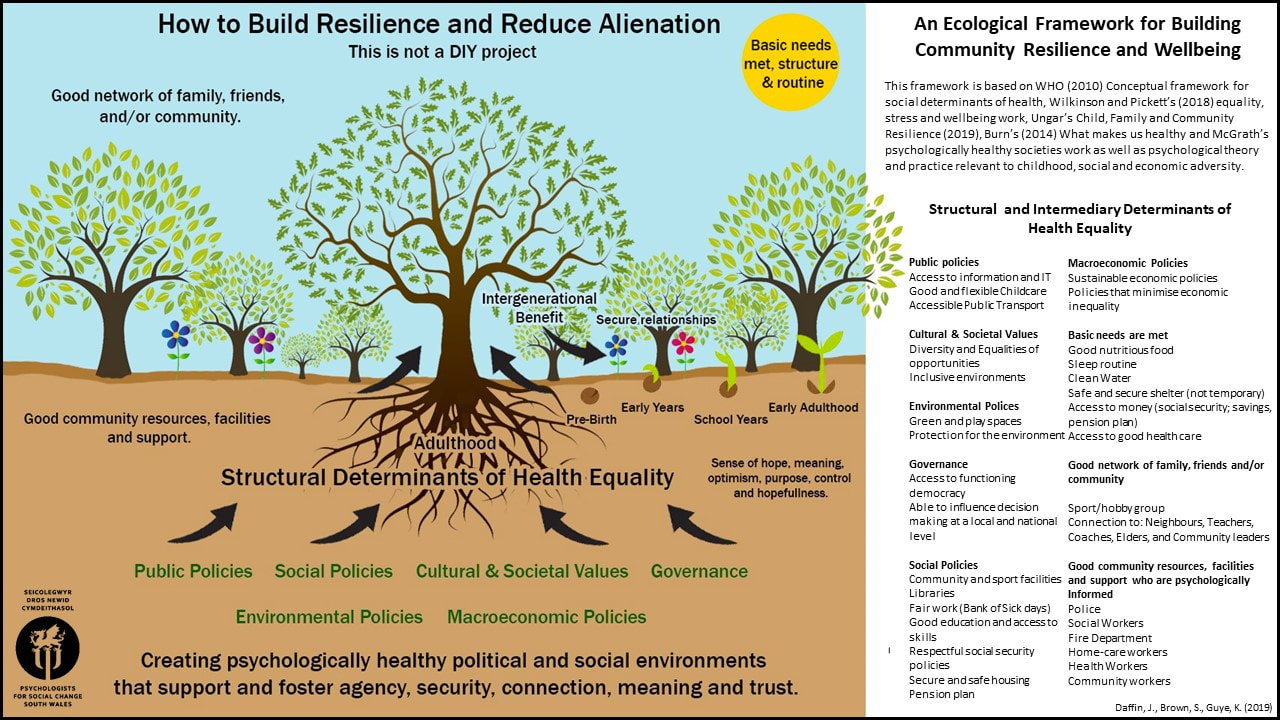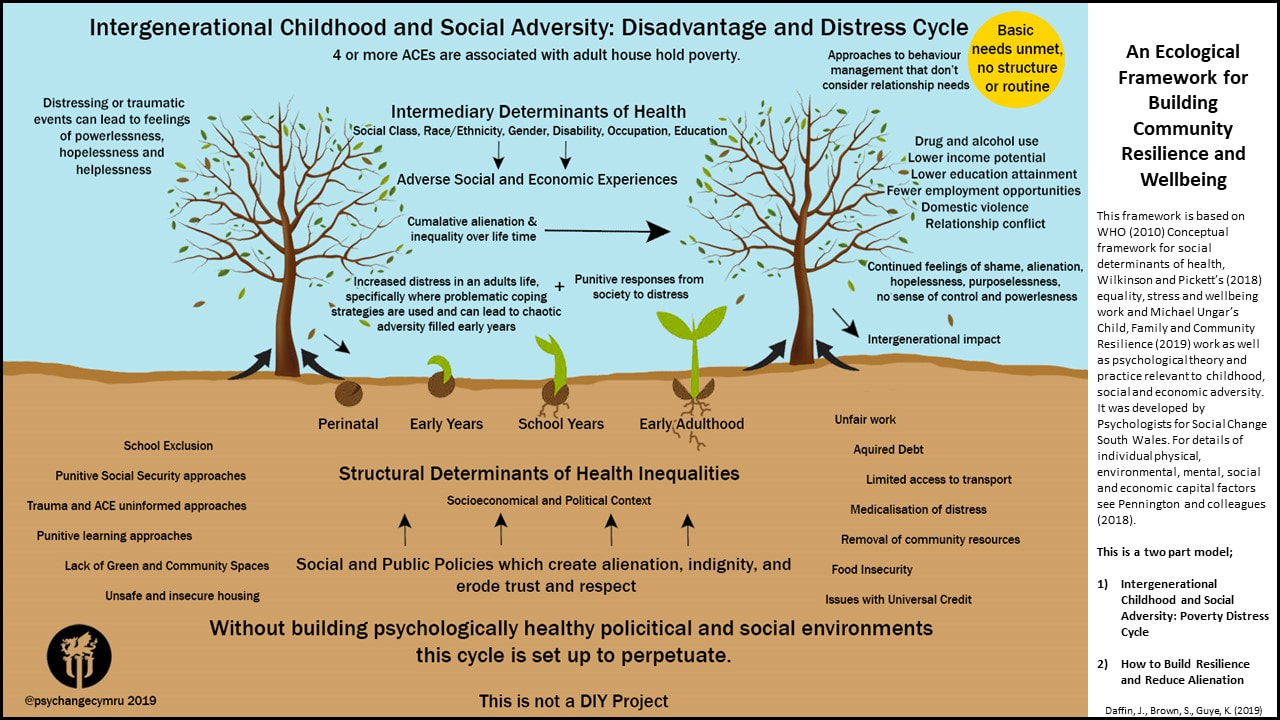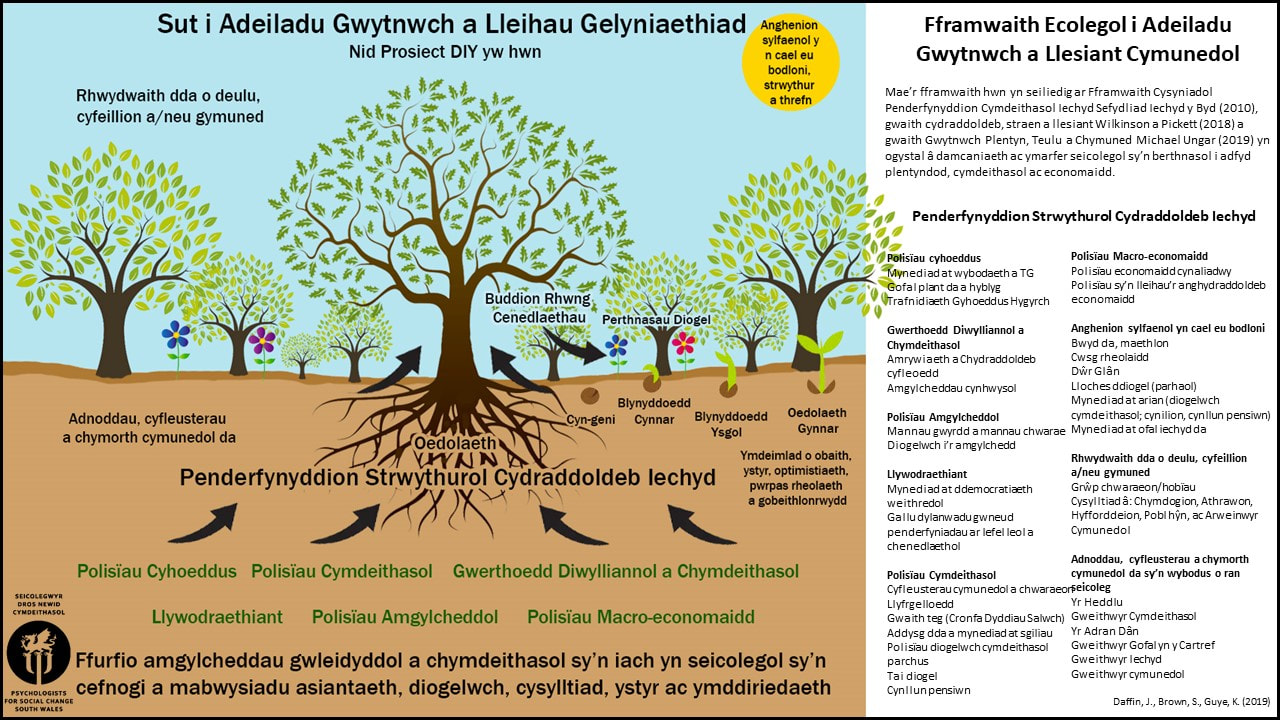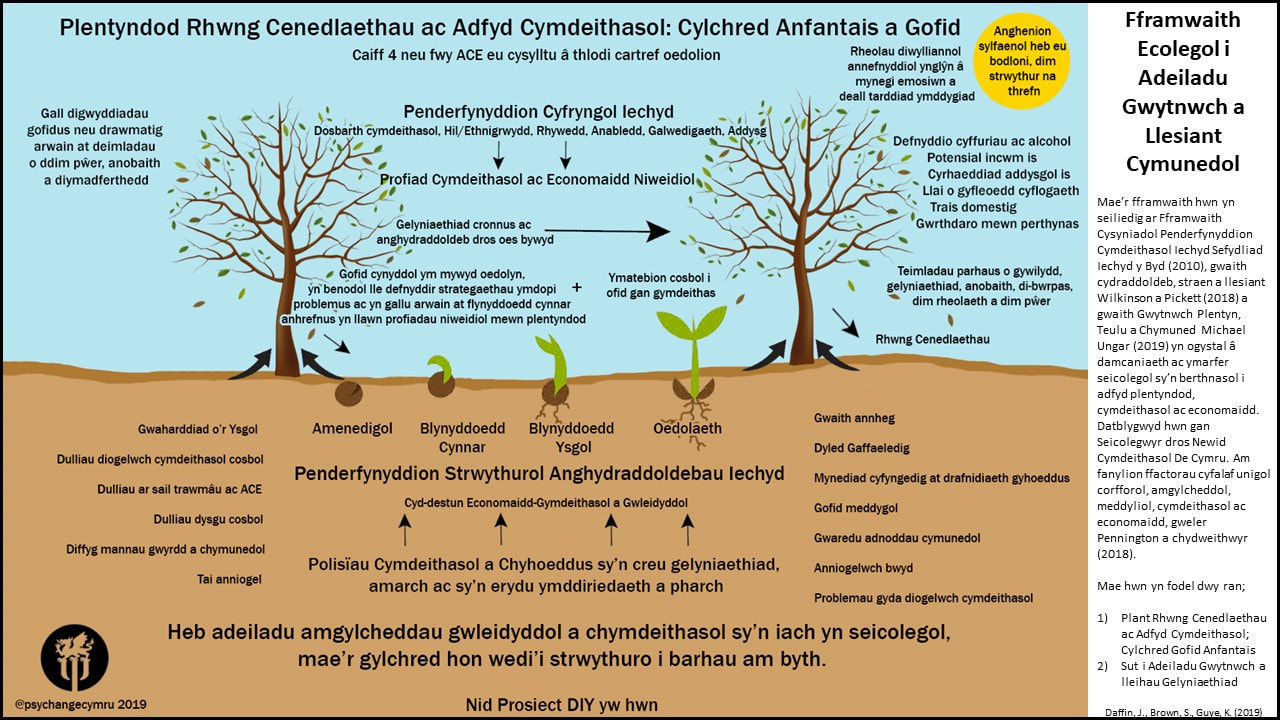Absolute power corrupts absolutely but absolute powerlessness does the same
It’s not the poverty.
It’s the inequality,
That we live with every day that will turn us insane
Akala
It’s not the poverty.
It’s the inequality,
That we live with every day that will turn us insane
Akala
This framework is based on WHO (2010) Conceptual framework for social determinants of health, Wilkinson and Pickett’s (2018) equality, stress and wellbeing work and Michael Ungar’s Child, Family and Community Resilience (2019) work as well as psychological theory and practice relevant to childhood, social and economic adversity. It was developed by Psychologists for Social Change De Cymru.
It comes in two parts; 1) Intergenerational Children and Social Adversity; Disadvantage Distress Cycle, 2) How to Build Resilience and reduce Alienation.
Mae’r fframwaith hwn yn seiliedig ar Fframwaith Cysyniadol Penderfynyddion Cymdeithasol Iechyd Sefydliad Iechyd y Byd (2010), gwaith cydraddoldeb, straen a llesiant Wilkinson a Pickett (2018) a gwaith Gwytnwch Plentyn, Teulu a Chymuned Michael Ungar (2019) yn ogystal â damcaniaeth ac ymarfer seicolegol sy’n berthnasol i adfyd plentyndod, cymdeithasol ac economaidd. Datblygwyd hwn gan Seicolegwyr dros Newid Cymdeithasol De Cymru.
Daw mewn dwy ran; 1) Plant Rhwng Cenedlaethau ac Adfyd Cymdeithasol; Cylchred Gofid Anfantais, 2) Sut i Adeiladu Gwytnwch a lleihau Gelyniaethiad.
Authors:
Jen Daffin, P Clinical Psychologist
Dr Sarah Brown, Clinical Psychologist
Dr Kiran Guye, Clinical Psychologist
Email/ Ebost
Psychologists for Social Change Cymru - [email protected]
It comes in two parts; 1) Intergenerational Children and Social Adversity; Disadvantage Distress Cycle, 2) How to Build Resilience and reduce Alienation.
Mae’r fframwaith hwn yn seiliedig ar Fframwaith Cysyniadol Penderfynyddion Cymdeithasol Iechyd Sefydliad Iechyd y Byd (2010), gwaith cydraddoldeb, straen a llesiant Wilkinson a Pickett (2018) a gwaith Gwytnwch Plentyn, Teulu a Chymuned Michael Ungar (2019) yn ogystal â damcaniaeth ac ymarfer seicolegol sy’n berthnasol i adfyd plentyndod, cymdeithasol ac economaidd. Datblygwyd hwn gan Seicolegwyr dros Newid Cymdeithasol De Cymru.
Daw mewn dwy ran; 1) Plant Rhwng Cenedlaethau ac Adfyd Cymdeithasol; Cylchred Gofid Anfantais, 2) Sut i Adeiladu Gwytnwch a lleihau Gelyniaethiad.
Authors:
Jen Daffin, P Clinical Psychologist
Dr Sarah Brown, Clinical Psychologist
Dr Kiran Guye, Clinical Psychologist
Email/ Ebost
Psychologists for Social Change Cymru - [email protected]
We can’t talk about mental health and not talk about poverty
Jen Daffin , Dr Sarah Brown, Dr Kiran Guye and Dr Matt Yates
Many of us think that getting through challenging experiences and facing hardship is what makes us resilient. Whilst we will be shaped by these experiences, it turns out that our wellbeing and resilience comes from much more. The reality is that our position in society has a huge impact on our psychological health and resilience. Without the sun nothing would grow, in the same way, we can’t thrive without our basic physical and emotional needs being met.
Using the metaphor of a tree we have developed the ‘How to Build Resilience and Reduce Alienation’ framework to show how our life circumstances impact us psychologically, how that distress perpetuates and plays out at a community level too.
Well-meaning statements like ‘one in four people will experience a mental health problem’ imply that poor mental health occurs equally and randomly across the population according to the fate of our levels of personal ‘resilience’ or biology.
However, this is not true. For example, those from the lowest 20% of household income are three times more likely to have a common mental health problem and nine times as likely to receive a diagnosis of a “psychotic disorder”. Black and minority ethnic groups are far more likely to be detained under the Mental Health Act and half of the children in youth custody have also been in the care system.
Just like a tree needs the right soil and strong roots to grow, we too will only be able to grow, live and flourish if the right things are in place. The places we are born, grow, live, work and age have a huge impact on our mental and physical health.
Our access to work, money and resources, safe and secure housing, green spaces, education and skills, nutritious food to eat, access to transport, and belonging and feeling connected to family, friends and community accounts for approximately 40% of our health outcomes. Our access to these will determine how well we are able to meet our basic physical and emotional needs as individuals and communities.
We all live somewhere within this ‘context’, which means our lives are shaped by how much ‘power’ we have access to. But our access is far from equal.
This access is determined by three things:
1) The socio-political context in which we live.
2) Our socio-economic position e.g. class, ethnicity, sexuality, gender, disability, level of education.
3) Intermediary factors such as our material circumstances, psychosocial circumstances, behavioural and/or biological factors, and access to good healthcare.
For a tree to grow into a forest, it needs others to develop around it. We too grow our strongest when we are surrounded by good public and social policies; cultural and societal values which are inclusive, and a functioning democracy.
This is much more than simply about increasing access to mental health services or talking therapies. It’s about redefining our understanding of health and moving away from a narrow focus on the causes of disease to a more inclusive focus on the multiple factors that create and foster health and wellbeing.
Unmet needs perpetuate health inequity and intergenerational cycles of disadvantage and distress. Health inequity is the unfair but avoidable differences in health status seen within and between people.
Without a sense of control and a means of shaping our own destinies, feelings of despair, shame, purposelessness, meaninglessness and hopelessness fulfil a cycle of continued adversity and alienation.
Poverty, along with emotional and relational problems, are a consequence as much as a cause of unmet needs. A healthy forest enables new trees to blossom, just like psychologically healthy adults providing secure and supportive relationships allow children to blossom.
The links between our economic circumstances and our health and wellbeing outcomes have been well established and firmly evidenced. What this means is that we need to develop systems, policies and practices that reflect a psychologically informed understanding of health and wellbeing needs.
Uneven distribution of resources creates inequity between societies and communities. Austerity, rising inequality, and neoliberal policy decisions continue to skew this distribution and are forcing these problems to grow.
Health and social care approaches to mental health need to be delivered in ways that understand the impact of trauma and support connection and relationships. To address modern problems we need modern solutions, not management systems that reduce people to caseloads. Without addressing both our physical and emotional needs the cycles of disadvantage and distress will only become more entrenched.
To reduce the damaging psychological costs associated with the intergenerational cycles of distress and disadvantage we must understand this new way of thinking about health.
We then must shape our public services to better support relationships and social connections and empower people by allowing them to become the decision-makers. We need to make a pact to ensure the narrative around mental health changes, so that children are not carrying the burden of disadvantage into their adult lives.
Originally published at https://www.iwa.wales/agenda/2020/02/we-cant-talk-about-mental-health-and-not-talk-about-poverty/
Many of us think that getting through challenging experiences and facing hardship is what makes us resilient. Whilst we will be shaped by these experiences, it turns out that our wellbeing and resilience comes from much more. The reality is that our position in society has a huge impact on our psychological health and resilience. Without the sun nothing would grow, in the same way, we can’t thrive without our basic physical and emotional needs being met.
Using the metaphor of a tree we have developed the ‘How to Build Resilience and Reduce Alienation’ framework to show how our life circumstances impact us psychologically, how that distress perpetuates and plays out at a community level too.
Well-meaning statements like ‘one in four people will experience a mental health problem’ imply that poor mental health occurs equally and randomly across the population according to the fate of our levels of personal ‘resilience’ or biology.
However, this is not true. For example, those from the lowest 20% of household income are three times more likely to have a common mental health problem and nine times as likely to receive a diagnosis of a “psychotic disorder”. Black and minority ethnic groups are far more likely to be detained under the Mental Health Act and half of the children in youth custody have also been in the care system.
Just like a tree needs the right soil and strong roots to grow, we too will only be able to grow, live and flourish if the right things are in place. The places we are born, grow, live, work and age have a huge impact on our mental and physical health.
Our access to work, money and resources, safe and secure housing, green spaces, education and skills, nutritious food to eat, access to transport, and belonging and feeling connected to family, friends and community accounts for approximately 40% of our health outcomes. Our access to these will determine how well we are able to meet our basic physical and emotional needs as individuals and communities.
We all live somewhere within this ‘context’, which means our lives are shaped by how much ‘power’ we have access to. But our access is far from equal.
This access is determined by three things:
1) The socio-political context in which we live.
2) Our socio-economic position e.g. class, ethnicity, sexuality, gender, disability, level of education.
3) Intermediary factors such as our material circumstances, psychosocial circumstances, behavioural and/or biological factors, and access to good healthcare.
For a tree to grow into a forest, it needs others to develop around it. We too grow our strongest when we are surrounded by good public and social policies; cultural and societal values which are inclusive, and a functioning democracy.
This is much more than simply about increasing access to mental health services or talking therapies. It’s about redefining our understanding of health and moving away from a narrow focus on the causes of disease to a more inclusive focus on the multiple factors that create and foster health and wellbeing.
Unmet needs perpetuate health inequity and intergenerational cycles of disadvantage and distress. Health inequity is the unfair but avoidable differences in health status seen within and between people.
Without a sense of control and a means of shaping our own destinies, feelings of despair, shame, purposelessness, meaninglessness and hopelessness fulfil a cycle of continued adversity and alienation.
Poverty, along with emotional and relational problems, are a consequence as much as a cause of unmet needs. A healthy forest enables new trees to blossom, just like psychologically healthy adults providing secure and supportive relationships allow children to blossom.
The links between our economic circumstances and our health and wellbeing outcomes have been well established and firmly evidenced. What this means is that we need to develop systems, policies and practices that reflect a psychologically informed understanding of health and wellbeing needs.
Uneven distribution of resources creates inequity between societies and communities. Austerity, rising inequality, and neoliberal policy decisions continue to skew this distribution and are forcing these problems to grow.
Health and social care approaches to mental health need to be delivered in ways that understand the impact of trauma and support connection and relationships. To address modern problems we need modern solutions, not management systems that reduce people to caseloads. Without addressing both our physical and emotional needs the cycles of disadvantage and distress will only become more entrenched.
To reduce the damaging psychological costs associated with the intergenerational cycles of distress and disadvantage we must understand this new way of thinking about health.
We then must shape our public services to better support relationships and social connections and empower people by allowing them to become the decision-makers. We need to make a pact to ensure the narrative around mental health changes, so that children are not carrying the burden of disadvantage into their adult lives.
Originally published at https://www.iwa.wales/agenda/2020/02/we-cant-talk-about-mental-health-and-not-talk-about-poverty/




